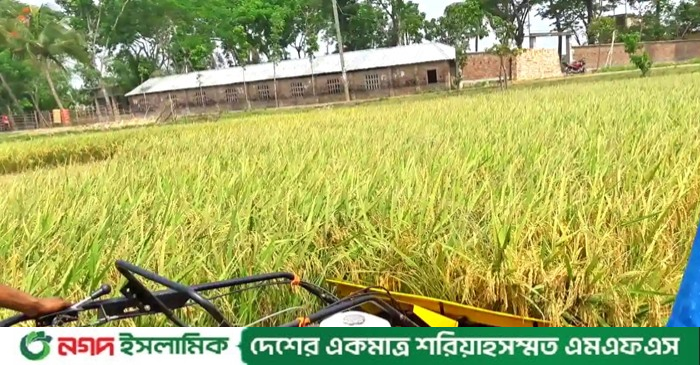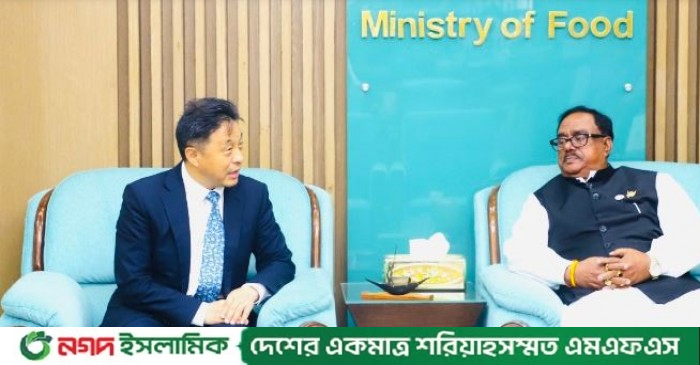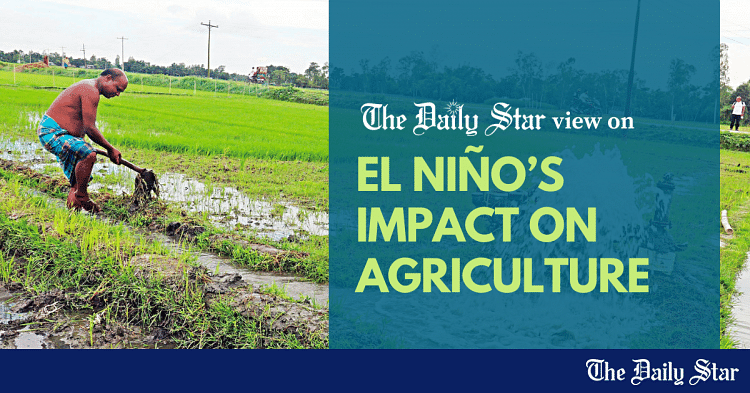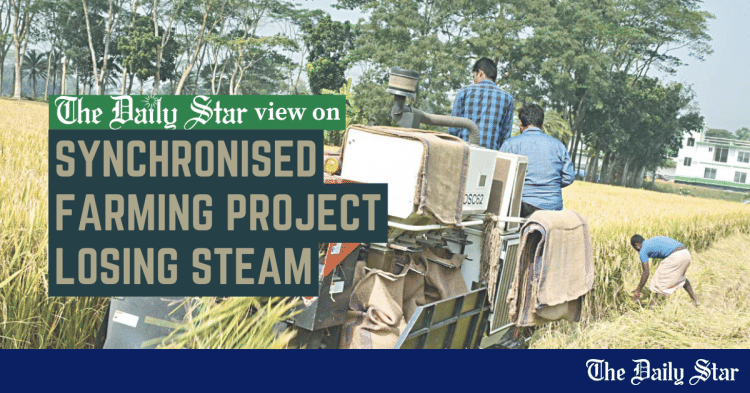Saif
Senior Member
- Joined
- Jan 24, 2024
- Messages
- 17,319
- Likes
- 8,344
- Nation

- Residence

- Axis Group

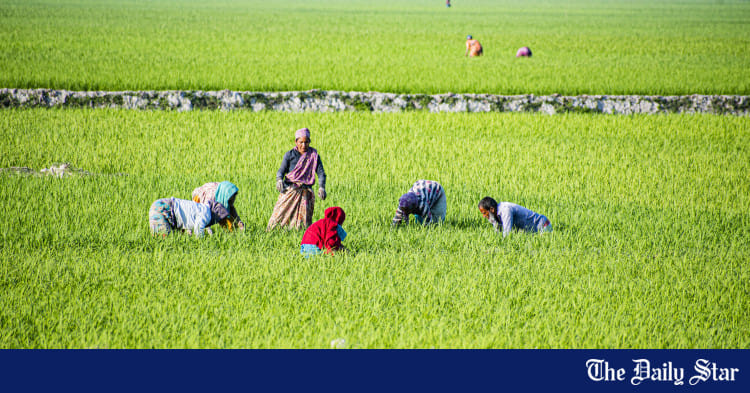
Gender wage gap still persists in agriculture
Farmers in Gobindaganj upazila of Gaibandha are currently engaging labourers to weed their fields of Boro season paddy ahead of the upcoming harvesting period.
Gender wage gap still persists in agriculture
Female farmhands engaged in weeding on a piece of land growing Boro season paddy in Kuptola village of Gaibandha sadar upazila recently. Here women get Tk 300 working from 8:00am to 5:00pm whereas men Tk 400 to Tk 500, a stark reminder of persistent inequalities between men and women in the workplace. According to UN Women, the gender pay gap stands at 20 percent globally, meaning women workers earn 80 percent of what men do. And the cumulative effect of pay disparities has real, daily negative consequences for women, their families, and society, especially during crises. Photo: Mostafa Shabuj
Farmers in Gobindaganj upazila of Gaibandha are currently engaging labourers to weed their fields of Boro season paddy ahead of the upcoming harvesting period.
Interestingly, there are more women working in the fields than men, indicating a major paradigm shift in the once male-dominated agriculture industry.
But despite the narrowing gender gap, the significant wage gap between men and women in this line of work still persists, with male workers earning around Tk 450 per day while females make Tk 300.
As such, industry people say the prevalence of women in fields suggests that landowners have a financial motive to lower costs by hiring the comparatively cheaper female workers.
This is because the lower wages paid to female labourers allow landowners to enjoy the advantage of being able to hire a greater number of workers, thereby reducing the time needed to complete the work.
The wage discrepancy is not a new phenomenon as women have historically been paid less than men across all industries. And even when overall wages increase, the gap remains the same, they said.
Rina Begum, who works at a field in the Kuptula area of Gaibandha to support her family of five, said she was afraid to speak out against income inequality.
"If I speak against income inequality, then there will be fewer employment opportunities for me," she added.
Roshna Bewa, a 60-year-old widow, said she has been working in fields across Gaibandha for two decades since her husband's passing, with the stagnant wage gap not giving her any respite.
Abu Bakar, a landowner in Sadullapur upazila, employs four women for weeding. According to him, the wages paid to women are the market standard.
Although the wage gap is financially beneficial for landowners, it is not helping women make progress in terms of equality in the agriculture industry.
Halima Begum, who works for Bakar, said societal norms dictate that men's and women's wages cannot be equal as men are perceived to be stronger and more productive.
"This flawed perception is one of the reasons we get paid less," she added.
Rozia Begum, another worker at Bakar's field, echoed the same. "Our only option is to go along with this discriminatory practice as the alternative of having no work is even more bleak," she said.
Sadeka Halim, vice-chancellor of Jagannath University, said the agriculture sector employs the highest number of women although they do not have equal rights or control over land.
A portion of them look after land on behalf of absentee landlords and there is also a good portion of female-headed households, she added.
Sadeka, a former dean of the social sciences faculty at Dhaka University, said women have made advances in the formal sector.
However, 46 percent of women still work in the informal sector, where there are no rules and regulations and it is mainly the employers who determine the terms and conditions, she said.
She said female workers do not take breaks like men but they are discriminated against as they lack a focal point to raise a voice in their favour.
"This is true for women agricultural workers too. They are very much voiceless. They do not have any organisation or group to raise their voice for them to protect and ensure their rights," said Sadeka.
"The labour ministry should engage all stakeholders and work for ensuring the rights of workers in the informal sector too," she said.
Sharmind Neelormi, professor of economics at Jahangirnagar University, blamed pay inequality on social norms that considered women's labour to be less efficient.
She said the wage disparity between male and male workers has narrowed little over the decades.
"Previously, only meals were provided. The margin was over 50 percent before in the 1990s, but it is now down to 20-25 percent," she explained.
But the situation has changed as the use of manual labour has decreased thanks to agricultural mechanisation. If the use of such machinery rises, the gap will be reduced, she added.
Sadika Haque, professor of agricultural economics at Bangladesh Agricultural University, says women work in crop fields and play a major role in production and post-harvest management.
In an article on women in agriculture and their empowerment in a book titled "Bangladesher Krishi Orthoniti", she, citing research findings, said out of 23 stages from rice production to storing, women participate in 17 stages.
She, however, said women workers in agriculture face wage discrimination, getting Tk 42 lower than their male counterparts a day.
The daily average wage of a female farm worker is Tk 388, she said in the book published in 2022.
Talking to The Daily Star yesterday, Sadika said the government should form a policy for farm workers to ensure fair wages for them regardless of gender.
She said there was a perception among employers and men that women workers do less work than men.
"This is a wrong perception. Rather, women work sincerely as long as they stay in the workplace," said Sadika.
"Awareness of employers is also necessary, as is the need for change in social attitudes towards women workers," she said, adding that steps must also be taken to protect women workers from harassment.
Ensuring education for women is necessary to enhance their skills too, added Sadika.
As such, industry people say the prevalence of women in fields suggests that landowners have a financial motive to lower costs by hiring the comparatively cheaper female workers.
This is because the lower wages paid to female labourers allow landowners to enjoy the advantage of being able to hire a greater number of workers, thereby reducing the time needed to complete the work.
The wage discrepancy is not a new phenomenon as women have historically been paid less than men across all industries. And even when overall wages increase, the gap remains the same, they said.
Rina Begum, who works at a field in the Kuptula area of Gaibandha to support her family of five, said she was afraid to speak out against income inequality.
"If I speak against income inequality, then there will be fewer employment opportunities for me," she added.
Roshna Bewa, a 60-year-old widow, said she has been working in fields across Gaibandha for two decades since her husband's passing, with the stagnant wage gap not giving her any respite.
Abu Bakar, a landowner in Sadullapur upazila, employs four women for weeding. According to him, the wages paid to women are the market standard.
Although the wage gap is financially beneficial for landowners, it is not helping women make progress in terms of equality in the agriculture industry.
Halima Begum, who works for Bakar, said societal norms dictate that men's and women's wages cannot be equal as men are perceived to be stronger and more productive.
"This flawed perception is one of the reasons we get paid less," she added.
Rozia Begum, another worker at Bakar's field, echoed the same. "Our only option is to go along with this discriminatory practice as the alternative of having no work is even more bleak," she said.
Sadeka Halim, vice-chancellor of Jagannath University, said the agriculture sector employs the highest number of women although they do not have equal rights or control over land.
A portion of them look after land on behalf of absentee landlords and there is also a good portion of female-headed households, she added.
Sadeka, a former dean of the social sciences faculty at Dhaka University, said women have made advances in the formal sector.
However, 46 percent of women still work in the informal sector, where there are no rules and regulations and it is mainly the employers who determine the terms and conditions, she said.
She said female workers do not take breaks like men but they are discriminated against as they lack a focal point to raise a voice in their favour.
"This is true for women agricultural workers too. They are very much voiceless. They do not have any organisation or group to raise their voice for them to protect and ensure their rights," said Sadeka.
"The labour ministry should engage all stakeholders and work for ensuring the rights of workers in the informal sector too," she said.
Sharmind Neelormi, professor of economics at Jahangirnagar University, blamed pay inequality on social norms that considered women's labour to be less efficient.
She said the wage disparity between male and male workers has narrowed little over the decades.
"Previously, only meals were provided. The margin was over 50 percent before in the 1990s, but it is now down to 20-25 percent," she explained.
But the situation has changed as the use of manual labour has decreased thanks to agricultural mechanisation. If the use of such machinery rises, the gap will be reduced, she added.
Sadika Haque, professor of agricultural economics at Bangladesh Agricultural University, says women work in crop fields and play a major role in production and post-harvest management.
In an article on women in agriculture and their empowerment in a book titled "Bangladesher Krishi Orthoniti", she, citing research findings, said out of 23 stages from rice production to storing, women participate in 17 stages.
She, however, said women workers in agriculture face wage discrimination, getting Tk 42 lower than their male counterparts a day.
The daily average wage of a female farm worker is Tk 388, she said in the book published in 2022.
Talking to The Daily Star yesterday, Sadika said the government should form a policy for farm workers to ensure fair wages for them regardless of gender.
She said there was a perception among employers and men that women workers do less work than men.
"This is a wrong perception. Rather, women work sincerely as long as they stay in the workplace," said Sadika.
"Awareness of employers is also necessary, as is the need for change in social attitudes towards women workers," she said, adding that steps must also be taken to protect women workers from harassment.
Ensuring education for women is necessary to enhance their skills too, added Sadika.



































